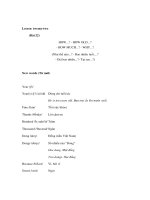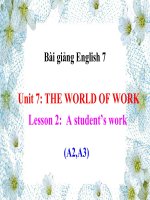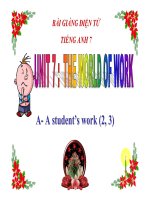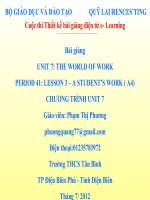Slide bài giảng tiếng anh chuyên ngành kinh tế unit 22 how does inflation affect the world economy
Bạn đang xem bản rút gọn của tài liệu. Xem và tải ngay bản đầy đủ của tài liệu tại đây (116.72 KB, 18 trang )
How does inflation affect the
world economy?
Unit 22
Reading comprehension
+ Why is it said that an economy that grows too
quickly can be a bad thing?
Because with a decline in unemployment,
companies are forced to pay higher wages for
scarce workers and prices of goods and
services are raised to pay (make up) for their
increased costs.
Reading comprehension
What might a booming economy lead to?
This can lead to an inflation rise as
consumers and businesses compete with each
other for goods and services, bidding up
prices in their hurry to buy a limited amount
of products.
Reading comprehension
+ What do workers expect when prices
increase?
They expect increasingly higher wages to
“keep up with inflation”.
Reading comprehension
What is the role of government and central
banks in fighting inflation?
When they see signs of inflation, they try
to slow down the economy by increasing
interest rates, which makes almost all
activities more expensive.
Reading comprehension
What happen if interest rates increase?
If interest rates increase, they tend to
discourage business and consumer spending,
leading to a reduction in jobs and a slow
down in the economy.
Reading comprehension
+ How does inflation affect the world
economy?
Inflation in a country can affect foreign
investment. If inflation is not favourable,
investors quickly move their money out,
preferring to invest their funds in countries
with more stable economic growth and
predictable inflation rates.
Vocabulary
Word family: product
1. productive
2. production
3. productivity
4. production
5. produce
6. produce
Vocabulary
1. predictable
2. crisis
3. rear its ugly head
4. forced
5. booming
6. moved
7. Raise/ bid up
8. raise
9. debt
10.booming
11.energy
12.lead to
Translation
1. Nhu cầu về năng lượng, nguyên liệu và hàng hoá tăng
mạnh do nền kinh tế thế giới đã tăng trưởng ở tốc độ cao
từ năm 2004. Điều này dẫn đến giá cả tăng trên thị trường
thế giới cũng như trên thị trường nội địa.
2. Các nhà kinh tế học cho rằng lạm phát và giá cả leo thang
tiếp tục là vấn đề đối với hàng hoá nội địa trên thị trường
vốn đã và đang mất lợi thế cạnh tranh với hàng hoá nhập
khẩu.
3. Trong nỗ lực kiềm chế lạm phát, chính phủ tiếp tục thuyết
phục người dân mua sản phẩm sản suất tại VN. Mặt khác,
tăng trưởng sản suất và xuất khẩu là vô cùng quan trọng.
Translation
1. Nhu cầu về năng lượng, nguyên liệu và hàng hoá
tăng mạnh do nền kinh tế thế giới đã tăng trưởng ở
tốc độ cao từ năm 2004. Điều này dẫn đến giá cả
tăng trên thị trường thế giới cũng như trên thị
trường nội địa.
The demand for energy, materials and goods
has dramatically increased because/as the world
economy has grown at a high speed since 2004.
This has led to price increases in the world market
as well as in the domestic market. (both
international and local market)
Translation
Các nhà kinh tế học cho rằng lạm phát và giá
cả leo thang tiếp tục là vấn đề đối với hàng hoá
nội địa trên thị trường vốn đã và đang mất lợi thế
cạnh tranh với hàng hoá nhập khẩu.
Economists say that inflation and climbing
prices continues to be a problem to Vietnamese
products in the market which have lost their
competitive advantages (compared) to imported
ones.
Translation
Trong nỗ lực kiềm chế lạm phát, chính phủ
tiếp tục thuyết phục người dân mua sản phẩm sản
suất tại VN. Mặt khác, tăng trưởng sản suất và
xuất khẩu là vô cùng quan trọng.
In an effort to control inflation, the government
continues to convince people to buy made-in-
Vietnam (locally made) products instead of imported
products. On the other hand, promoting production
and exporting are extremely important.
Translation
4. Theo các chuyên gia kinh tế, đầu cơ là một trong những nguyên
nhân khiến giá của một số hàng hoá chủ chốt như thép, xi măng
và thực phẩm cao hơn nhiều so với giá thực của nó.
5. Giới đầu cơ thường hạn chế nguồn cung hàng hoá ra thị trường
và gây áp lực mạnh lên các siêu thị. Trong thực tế có sự khác
biệt lớn về giá cả giữa sản suất và phân phối sản phẩm.
6. Người dân đang trông đợi chính phủ giúp đỡ những doanh
nghiệp vừa và nhỏ giảm chi phí sản suất với mục đích giữ giá
một số hàng và nguyên liệu thiết yếu ở mức có thể mua được.
Translation
Theo các chuyên gia kinh tế, đầu cơ là một trong
những nguyên nhân khiến giá của một số hàng
hoá chủ chốt như thép, xi măng và thực phẩm
cao hơn nhiều so với giá thực của nó.
According to economic experts, speculation is
one of the factors causing/leading to the prices of
several key commodities such as steel, cement and
foodstuff to be much higher than their real prices.
Translation
Giới đầu cơ thường hạn chế nguồn cung hàng
hoá ra thị trường và gây áp lực mạnh lên các
siêu thị. Trong thực tế có sự khác biệt lớn về giá
cả giữa sản suất và phân phối sản phẩm.
Speculators often limit the supply of products in
the market and create much pressure on
supermarkets. In fact, there is a wide
difference/spread in prices between production and
distribution stages.
Translation
Người dân đang trông đợi chính phủ giúp đỡ
những doanh nghiệp vừa và nhỏ giảm chi phí sản
suất với mục đích giữ giá một số hàng và nguyên
liệu thiết yếu ở mức có thể mua được.
People are expecting the government to help small
and medium-sized companies/enterprises /SME reduce
their production costs with an aim to keep/ of keeping
the prices of essential goods and materials at
affordable prices.
With the view to/ in order to…
Extra exercise
•
Sự đầu cơ xăng dầu trên thị trường tự do sẽ
ảnh hưởng lớn đến công chúng nói chung
và các doanh nghiệp nói riêng.
The speculation of oil and petrol in free
market will dramatically affect the public in
general and businesses in particular.
… exert huge influence on …









